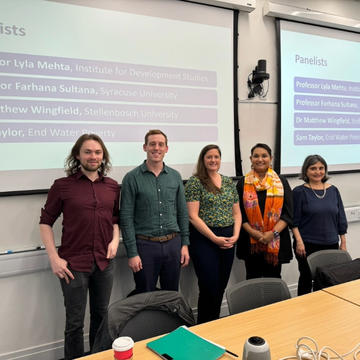Interrogating ‘water justice’ from within and beyond academia
In this article, Matthew and Catherine reflect on the key take-aways from a panel discussion on water injustice with academics and activists hosted at the University in June 2024.
“Water scarcity is seen as something that is physical, volumetric, and natural. It is rather largely caused by and legitimatised through forms of unequal gender, social, and power relations”- Lyla Mehta, Panellist
In an era of what Secretary-General of the United Nations Antonio Guterres calls “global boiling” as an extreme form of global warming, access to sufficient and uncontaminated water is an increasingly pressing issue. Often engaged through the concepts of water scarcity and water insecurity, a disconnect exists between academic research and lived realities. On the 20th June 2024, an event co-hosted by the School of Geography and the Environment and the Oxford Water Network (OWN), partly funded by the African Oxford Initiative (AfOx), brought together activist scholars and practitioners to explore the topic of water justice.

Panellists & Co-convenors (left to right): Mr Sam Taylor (Panellist), Dr Matthew Wingfield (Co-convenor & Panellist), Dr Catherine Fallon-Grasham (Co-convenor & Chair), Prof Farhana Sultana (Panellist), Prof Lyla Mehta (Panellist)
The politics and power of water injustice
Despite common beliefs, differentiated access to water is rarely a natural phenomenon and is in fact shaped by political decisions and social realities. For example, water access in postcolonial nations continues to be shaped by patterns of colonial settlement and control. This tension was probed by the chair and co-convenor of the event, Dr Catherine Grasham, as she posed questions to each panellist. As highlighted by Prof Lyla Mehta, water often flows favourably in the direction of the political and economic elite, regardless of the country. This broader perspective was complimented with the importance of place-based and bottom-up views of how water injustice is continually reproduced.
Water injustice with an intersectional approach
By specifically speaking to the lived realities in Dhaka, Bangladesh, Prof Farhana Sultana highlighted how water injustice links to inequalities around gender and social reproduction. As women are often responsible for water collection in contexts where formalised water infrastructure has either broken down or is entirely missing, they are much more likely to be affected by water contamination and violence in spaces of acute water scarcity. Prof Sultana therefore encouraged us to pay particular attention to geographic, contextual, and cultural specificities of water injustice.
Climate change exacerbates unequal access to water
Drawing on his experience as a researcher and activist in South Africa, Dr Matthew Wingfield spoke to the legal and political activism work he had been a part of during the “Day Zero” drought in Cape Town, from 2015-2018. He further highlighted how a focus on water governance and infrastructure development needs to focus on how people relate to water (and contest its wastage and contamination) especially in arid areas and contexts vulnerable to the negative impacts of climate change.
Funding is needed for activists on the ground
Sam Taylor, Senior Engagement Officer at End Water Poverty reinforced this practical way of engaging with water injustice, through case studies he has been involved in across the world. He did so by highlighting the importance of financing for activism that advocates and develops pathways for water justice. Through his work in supporting water justice activists across the world, he reiterated the cross-cutting theme prompted by Dr Grasham regarding the diverse ways in which water injustice can be situated in different localities.
Water injustice and its impacts need to be understood practically, while benefitting from academia. Creative connections between civil society and academic work are required in developing water justice across contexts.
https://www.youtube.com/embed/PLQfHbJlXGI?si=9ZxWmjopSXSdeYen



